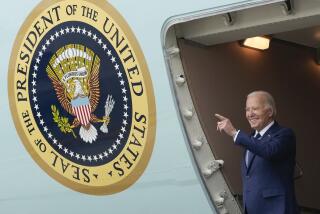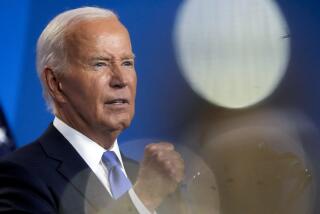Bright Idea for Fixing Primaries
Sometimes it seems there’s a rule in government that a simple problem can be solved only by complicated and convoluted means. But Secretary of State Bill Jones appears to have come up with a delightfully plain and clean fix for a tricky dilemma involving California’s 2000 presidential primary. Political insiders who have struggled with the problem in recent weeks were almost stunned that Jones’ answer was so straightforward and ingenious.
The problem concerns California’s new open primary law, which allows any voter to cast a ballot for a candidate of any party. What was not foreseen was that national political party rules do not allow crossover voting in presidential primary elections. Thus, the parties would not seat national convention delegations allocated in an election in which Republicans could vote for Democratic presidential candidates and vice versa.
An attempt to correct the situation failed when voters rejected Proposition 3 on Nov. 3. That apparently left the parties with the unhappy choice of selecting national convention delegates by state conventions or party caucuses--both throwbacks to the days of smoke-filled rooms.
But Jones wondered why election officials couldn’t just code each ballot by party, sort of conducting an election within an election. There would be one count of the votes of everyone reflecting their preference for presidential candidates. Then the computers could tally just the ballots coded for Democrats and Republicans. The national parties could use the result to allocate convention delegates. There would be no confidentiality issue since Democrats and Republicans already receive separate ballots due to election of their respective central committees.
The cost would be low, and state Republican and Democratic leaders seem to think this system would work fine. If Jones’ plan is blessed by national party leaders, and no glitches emerge, the Legislature should pass the needed legislation early next year in order to eliminate further confusion over how California will pick delegates to the nominating conventions in 2000.
More to Read
Get the L.A. Times Politics newsletter
Deeply reported insights into legislation, politics and policy from Sacramento, Washington and beyond. In your inbox three times per week.
You may occasionally receive promotional content from the Los Angeles Times.










